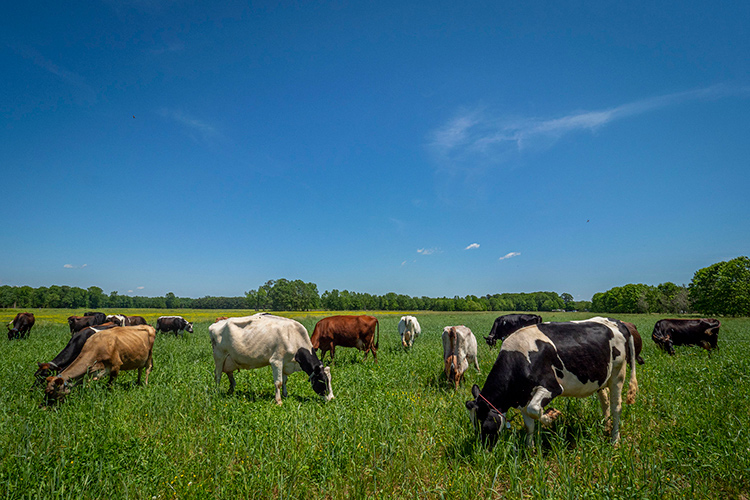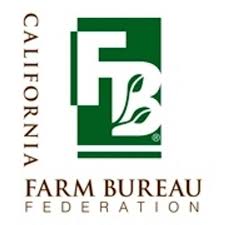
Credit: USDA
April 17, 2020 - By Ching Lee - After an initial spike in demand as COVID-19 spurred a run on milk and dairy products in grocery stores, dairy farmers now  face excess milk on the market and are being asked to slow production, find alternative buyers and, in some cases, discard milk.
face excess milk on the market and are being asked to slow production, find alternative buyers and, in some cases, discard milk.
Response to the pandemic has sapped "a substantial portion" of demand for dairy products for some manufacturers, as sales to restaurants, schools and other institutions "have really tanked," said Bill Schiek, an economist with the Dairy Institute of California.
Lack of demand for cheese, cream, butter and other dairy products made primarily for food service has constrained outlets for milk from the farm, he added.
"Processing and manufacturing plants are not willing to make products for a market that isn't there," he said, "especially if the products that they make don't store very well."
Impacts from the novel coronavirus have exposed snarls in the food-supply chain, as grocery stores scramble to refill shelves and food companies face difficulty trying to switch from making products destined for restaurants to the type of packaging appropriate for retail.
Such logistical problems, along with lost sales to food service and full warehouses, have forced some U.S. processors to take less milk or to idle completely, reported Sarina Sharp, a market analyst based in Michigan. Even though plants that make storable dairy products such as powder, butter and cheese are running as hard as they can, she said, "there is simply too much milk and too much cream."
The need to reduce the flow of milk from farms comes as warming weather brings what dairy farmers call "spring flush," a seasonal increase in production that Schiek said makes finding homes for milk "always tough" this time of year.
"This could not have happened at a worst time," San Joaquin County dairy farmer Hank Van Exel said.
It's unclear how much of the state's milk has needed to be dumped, said Anja Raudabaugh, CEO of Western United Dairies, but dairy groups estimate the current U.S. milk supply exceeds demand by at least 10%, a gap that could widen as production across the nation hits its seasonal peak and shelter-in-place orders linger. Raudabaugh said dairies across the state have been told to cut their production by at least 10% to as much as 35%.
The U.S. Department of Agriculture has assured producers they won't be inappropriately penalized if they must discard milk due to market disruptions caused by the pandemic. In addition, USDA is allowing dumped milk to be counted as milk marketings for the Dairy Revenue Protection program or as actual marketings for the Livestock Gross Margin for Dairy program.
Merced County dairy farmer Simon Vander Woude, board chairman of California Dairies Inc., which produces 40% of the state's milk and operates processing plants throughout the Central Valley, said he's heard milk dumping has been occurring, though the cooperative so far has managed to handle all its members' milk. However, making changes to processing lines to run different packaging is not easy and takes at least 18 months, he noted.
"We can make (55-pound) blocks of butter all day long, but you don't see them selling those at Costco and Save Mart," he said.
Many processors that buy milk from CDI have lowered their orders, which has led to built-up inventory, Vander Woude said. Because the co-op has "promised our producers we will handle their milk," he added, "we're being forced to make the food-service product without a customer right now."
"I'm not quite sure what it's going to mean financially in the end," Vander Woude said. "This is happening so fast—and that's the problem we're up against, is nobody could have planned for this."
Scott Magneson, whose farm produces organic milk in Merced County, said a Los Angeles-based company to which he sells milk has asked him to reduce 20% of his production due to declining sales. Another organic milk handler is now sending part of his milk out of state to make powder because it lacks processing space here, he said.
Before being asked to cut production, Magneson said he was already receiving a lower, conventional price for his organic milk, and now, "there's no market for conventional either," he added, which means if he produces more than his base, he won't be paid at all for that milk. Though he's trying to locate other outlets, he said he's not expecting to find any.
To slow production, Magneson said he's dried some cows and will adjust feed rations. He said he'll probably also cull some cows, though noting that market has dropped significantly in recent weeks.
The impending closure this month of the milk-bottling plant Berkeley Farms in Hayward has further reduced the state's processing capacity. The plant is owned by Dallas-based Dean Foods, which filed for Chapter 11 bankruptcy protection last fall and has not been able to find a buyer for the property.
The plant closure left Monterey County dairy farmers Louis and Carol Calcagno without a home for their milk. After 62 years in the business, Carol Calcagno said they have no choice but to sell their cows, shut their 2,700-cow dairy and let go of their 17 employees. She said they've tried to find other buyers, but nobody will take their milk because "warehouses are full of cheese and they can't use the milk."
"This has been our whole life," she said, "so it's going to be a big void in our life."
Though his milk continues to be picked up, Kings County dairy farmer Joaquin Contente, who ships to Land O' Lakes, said the co-op has begun enforcing restrictions on production by deducting pay on milk delivered over producers' base. He noted milk prices are now falling to levels not seen since the 2008-09 market collapse. These conditions follow years of unprofitable milk prices that have led a growing number of California dairies to shutter.
Unlike other businesses that have been forced to shut down and lay off employees due to COVID-19, Van Exel said dairies must continue to operate because they deal with live animals that need to be fed, milked and cared for every day.
"There's a whole bunch of people who are going to go broke unless the government or somebody steps in and gets some stabilization going," Sacramento County dairy farmer Case van Steyn said.
Dairy groups have urged the USDA to take swift action to mitigate the economic damage to dairy farmers by implementing measures that include paying producers $3 per hundredweight of milk on 90% of their production if they cut production by 10%; compensating producers and handlers for milk that must be disposed of; and buying substantial volumes of dairy products for feeding programs.
(Ching Lee is an assistant editor of Ag Alert. She may be contacted at clee@cfbf.com.)
Reprinted with permission: California Farm Bureau Federation








